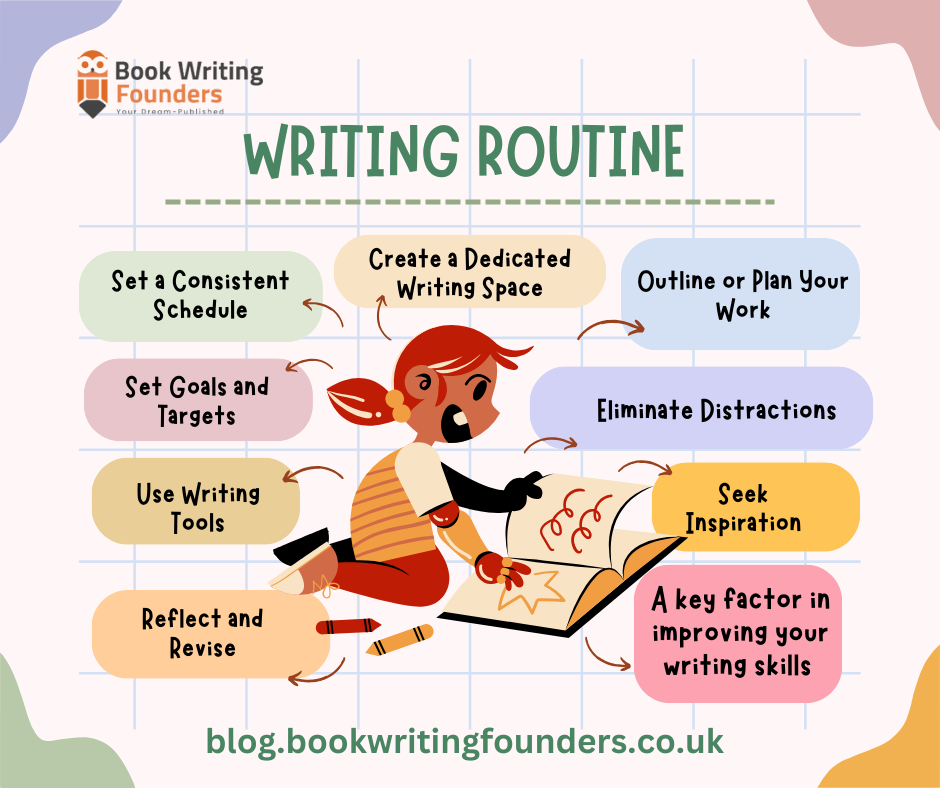
Writing
Getting started is often the most challenging part of being a writer. We are often held back by the fear of failure, which prevents us from pursuing our dream of becoming a published author. However, we can find inspiration by examining the habits of successful writers and understanding what drove them to write and publish their work.
Establishing a productive writing routine is crucial whether you’re an experienced author or just starting. A writing routine helps you stay organized motivated, and consistently produce quality content.
To encourage you to start writing, Book Writing Founders UK provides tips to help you find and maintain a writing routine that works for you.
1. Set a Dedicated Writing Space and time
Find a quiet and comfortable spot where you can focus without distractions. It could be a desk in your room, a cozy corner, or even a quiet café. Having a dedicated space signals to your brain that it’s time to get into the writing groove.
Just like setting a space, choosing a regular writing time is essential. It could be in the morning, during your lunch break, or before bedtime. Consistency helps your brain adapt to your writing routine.
2. Set Realistic Goals
One of the keys to successful authorship is setting achievable goals. Instead of aiming to write an entire book in a day, start with smaller targets.
For instance, commit to writing several words or pages daily. Achieving these goals will give you a sense of accomplishment and motivate you to keep going.
3. Beat Procrastination and eliminate distractions
Procrastination is a sneaky writing foe. It can creep in when you least expect it. If you procrastinate, try setting a timer for a short burst of writing. Even just 15 minutes of focused writing can break the procrastination spell.
Distractions can disrupt your writing flow. Put away your phone, turn off notifications, and let your family or roommates know it’s your writing time. Minimizing interruptions will help you stay in the creative zone.
4. Start with a Warm-Up
Sometimes, starting can be the hardest part. Begin with a warm-up exercise. Jot down your thoughts, brainstorm ideas, or write a journal entry. This can help ease you into your writing session.
Don’t worry too much about perfection in your first draft; just let the words flow freely. You can always revise and edit later. Focusing on perfection during the initial writing process can slow you down.
5. Find Your Creative Peak
We all have different times when our creativity peaks. Some people are morning birds, while others are night owls. Pay attention to when your creativity is at its best, and schedule your writing sessions accordingly.
6. Surround Yourself with Inspiration
Having inspiration around you can boost your creativity. Display art, quotes, or items that inspire you in your writing space. They can remind you of your writing goals and keep you motivated.
7. Seek feedback
Don’t be afraid to share your work with others and seek feedback. Constructive criticism can help you grow as a writer, so join a writing group or share your work with a trusted friend or family member so they can tell you about any improvements you can make.
8. Take Breaks
Taking short breaks during your writing sessions is essential to prevent burnout and keep your mind fresh. So, while writing, don’t forget to stand up, stretch, or take a brief walk to recharge your creativity.
9. Be Consistent
Consistency is the cornerstone of a productive writing routine. Even if you write only a little daily, it adds up over time. The more you stick to your writing routine, the easier and more enjoyable writing will become.
10. Keep a Writing Journal
A writing journal can be your best friend. Use it to jot down ideas, notes, or even moments of inspiration that strike at odd times. It’s a valuable resource to keep your writing organized.
11. Read Widely
A writer who does not read cannot write well, as reading enhances your writing skills. Explore different genres, authors, and styles and see how writers approach their writing. Reading widely can inspire you and improve your writing techniques.
12. Keep Learning
Writing is a craft that continuously evolves. If you want to improve, make learning a lifelong commitment. Explore writing courses, attend workshops, and delve into books about writing techniques and storytelling.
Learning from experienced authors and educators can provide you with fresh perspectives, new skills, and creative insights. The more you invest in learning, the more refined and captivating your writing will become.
13. Experiment and Have fun
Writing should be a joyous adventure, not a chore, so don’t be afraid to experiment. Try different genres, styles, and formats. Venturing beyond your comfort zone can spark your creativity and make writing more enjoyable.
The act of experimenting not only broadens your horizons but also keeps your passion for writing alive. After all, the most memorable and impactful stories often spring from bold experimentation and a sense of fun.
14. Stay Persistent
Writing isn’t always smooth sailing; there will be days when inspiration feels elusive, and self-doubt creeps in. On these tough days, your persistence will carry you through. Even when you don’t feel like writing, make an effort to sit down and put words on the page.
Remember, a rough draft can always be revised, but a blank page can’t. Stay dedicated to your craft; your commitment will propel you towards your writing goals.
15. Find Your Writing Tribe
A writer’s journey can sometimes feel solitary, but it doesn’t have to be. Connecting with fellow writers can be profoundly motivating. Seek out writing communities, both online and offline, where you can share your experiences, seek advice, and celebrate your successes.
These communities provide a network of support and understanding that can be invaluable when facing challenges or self-doubt. Your fellow writers can inspire you, provide feedback, and keep you accountable, making the writing journey more enjoyable and fulfilling.
Conclusion
Finding your writing routine is a personal journey. Experiment with these tips to discover what works best for you.
Remember, the most important thing is enjoying the process and staying committed to your writing goals. Whether you’re writing a short story, a novel, or just expressing your thoughts, a consistent routine will help you become a more productive and satisfied author.





